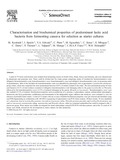Characterisation and biochemical properties of predominant lactic acid bacteria from fermenting cassava for selection as starter cultures

View/
Date
2007Author
Kostinek, M
Specht, I
Edward, V A
Pinto, C
Egounlety, M
Sossa, C
Mbugua, S
Dortu, C
Thonart, P
Taljaard, L
Mengu, M
Franz, C M A P
Holzapfel, W H
Type
ArticleLanguage
enMetadata
Show full item recordAbstract
A total of 375 lactic acid bacteria were isolated from fermenting cassava in South Africa, Benin, Kenya and Germany, and were characterised
by phenotypic and genotypic tests. These could be divided into five main groups comprising strains of facultatively heterofermentative rods,
obligately heterofermentative rods, heterofermentative cocci, homofermentative cocci and obligately homofermentative rods, in decreasing order
of predominance. Most of the facultatively heterofermentative rods were identified by phenotypic tests as presumptive Lactobacillus plantarumgroup
strains, which also comprised the most predominant bacteria (54.4% of strains) isolated in the study. The next predominant group of lactic
acid bacteria (14.1% of total isolates) consisted of obligately heterofermentative rods belonging either to the genus Lactobacillus or Weissella,
followed by the heterofermentative cocci (13.9% of isolates) belonging to the genera Weissella or Leuconostoc. Homofermentative cocci were
also isolated (13.3% of isolates). Biochemical properties such as production of α-amylase, β-glucosidase, tannase, antimicrobials (presumptive
bacteriocin and H2O2-production), acidification and fermentation of the indigestible sugars raffinose and stachyose, were evaluated in vitro for
selection of potential starter strains. A total of 32 strains with one or more desirable biochemical properties were pre-selected and identified using
rep-PCR fingerprinting in combination with 16S rRNA sequencing of representative rep-PCR cluster isolates. Of these strains, 18 were identified
as L. plantarum, four as Lactobacillus pentosus, two each as Leuconostoc fallax, Weissella paramesenteroides and Lactobacillus fermentum, one
each as Leuconostoc mesenteroides subsp. mesenteroides and Weissella cibaria, while two remained unidentified but could be assigned to the L.
plantarum-group. These strains were further investigated for clonal relationships, using RAPD-PCR with three primers, and of the 32 a total of 16
strains were finally selected for the development as starter cultures for Gari production.
Citation
International Journal of Food Microbiology 114 (2007) 342–351Publisher
Department of Food Science, Nutrition and Technology, University of Nairobi
Description
Journal artcle
